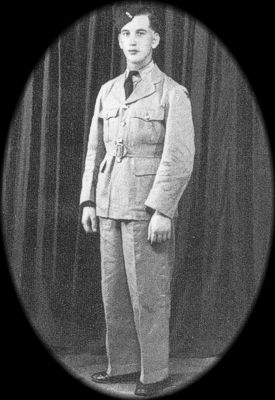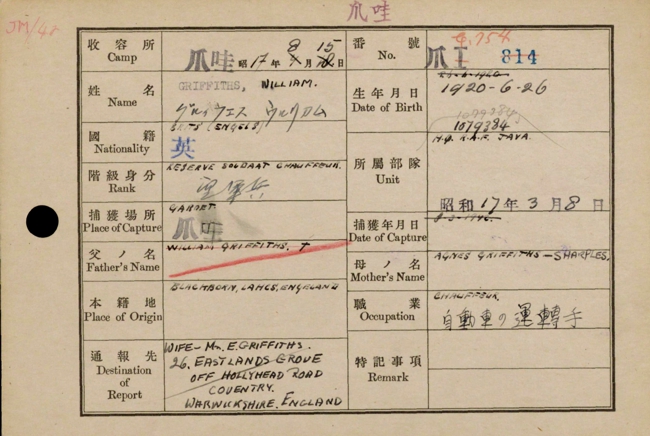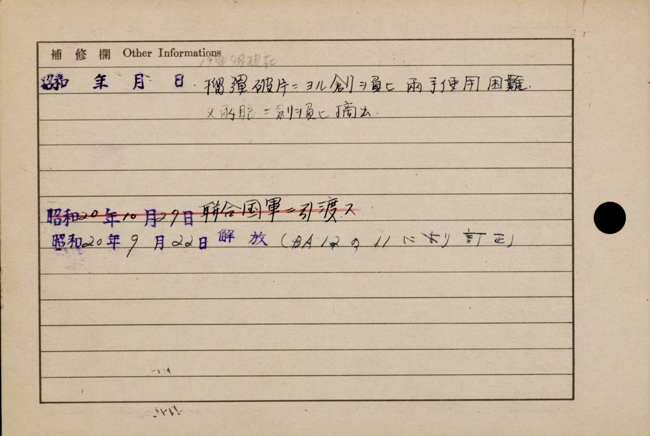|

1079384
Aircraftman 1st Class
William (Billy) Griffiths
M.B.E.

1920/06/26 - Born Blackburn
Royal Air Force
Kalong Airport, Singapore (February 1942)
Troop ship 'Empire Star' to Surabaya, Java (February 13th 1942)
Stranded in the village of Tasic Malay.
Bill and three others drove to Garoet, but found themselves surrounded by Japanese soldiers and became a Prisoners of War.
Bill and other prisoners were order to remove camouflaged booby traps by the Japanese, in the process he was blown up and lost both eyes and both hands, also shattering his leg.
Attended by Australian Surgeon Colonel Dunlop (later Sir Edward Dunlop) in Bandoeng, at a school made into a hospital, his life was saved.
The rest was up to Bill.
Japanese PoW
1942/03/08 - Captured Java
PoW No. 19051
Japanes Index Card - Side One

Japanese Index Card - Side Two

1945/09/02 - Liberated Batavia, Java
Published 1989
Blind To Misfortune
By
Bill Griffiths
Forward by:-
Sir Edward Dunlop, A.C., A.M.G., O.B.E., K.C.S., M.S., F.R.C.S., F.R.A.C.S., I.I.D, Hon, Mellb., D.Sc, Punjab (Hon.) Hpn, Fellow of the Colleges of Surgeons of Thailand and Sri Lanka.
In Java, 1942, as Commanding Officer of a hastily improvised Alliad General Hospital, as the victorious Japanese closed in, I was required both to establish priorities for treatment and to lead an operating team in dealing with a rush of casualties. The bomb-shattered body of a young man, L. A.C. Griffiths posed special problems. His eyes were shattered in the wreck of his face, his hands blown away, one leg with a severe compound fracture, he was peppered everywhere with imbedded fragments, and was exsanguinated and shocked. Surprised that he should have reached hospital at all, I took the rather illogical decision to allot him top priority, and to treat him myself. His torn bloodstained clothing removed, it seemed less than kindness to try to prolong his life.
As the faint thread of life responded following lengthy, there began the awful challenge of his total helplessness for even the most basic bodily functions, and the blank wall of darkness and the hopelessness of the future, I was confronted by his distressed, compassionate Dutch nurse who said, ‘Colonel, Bill wants to die, If you do not have the guts to kill him, I will’ !
Even the flickering candle of life seemed precious in a world collapsing about us in which many or all of us might die. I sternly forbade this solution.
Subsequently at the time of the savage, suddon break-up of the hospital, I was obliged to stand between Bill and the bayonets of the Japanese guards who regarded him as expendable.
Somehow he survived on a mixture of Lancashire pluck and the easy camaraderie in those camps of semi-starvation and death. There was almost no communication with home, but he built up hopes of taking up the threads of family life and entering the family transport business.
Home proved an even greater test of his courage. His marriage had collapsed, the business had gone, and his widowed mother was beyond bearing the strain of his personal care.
Ironically the long-promised artificial limbs seemed useless to an eyeless man.
Encouraged to go to St Dunstan’s. he found life began to dawn again. He enlisted his brother in the physical side of his successful transport business in which he handled the finance, business planning, telephone and typing. Alas, the nationalization of transport came as a cruel, disastrous blow to this enterprise.
Undeterred, he took up singing with the help and instruction of Alice, whom he eventually married, and the two of them became a wonderful team, not only as entertainers, but as inseparables, solving all difficulties - a totally inspiring pair.
In time, he has succeeded the famed Douglas Bader in the British mind as ‘Mr Disabled Man of Courage’. He has become of all things, ‘Mr Disabled Sportsman of the Year’. has been accorded the tribute of ‘This is your Life’. and has been decorated with an M.B.E. by the Queen. he has travelled widely overseas, accompanied by Alice, a splendid ambassador for, and representative of, St Dunstans. he has made several visits to Australia, has returned to Java and has been to ‘Hellfire Pass’ in Thailand.
This totally remarkable man, who has overcome a very limited education and appalling disabilities to become a national inspiration. humbles us all. I count him and Alice as very dear friends who command my deep affection and admiration.
Among other attirbutes of his warm and generous heart is a total absence of bitterness or envy, and a capacity for helping others and of forming close friendships at all social levels. Among them are ex-servicemen of several Allied Nations.
I commend this book confidently as a record of heroic courage and fortitude shown by a young man whose astonishing victory over blindness and handlessness is an inspiration to us all.
Inseparable in our admiration and affection are ‘Billy and Alice’ who are truly national treasures and are part of the pride of Blackpool.
Introduction by:-
Admiral of the Fleet Sir Henry Leach, Chairman of Dunstans
Among some 6,000 blinded ex-servicemen and women who have come to St Dunstans over the past 73 years there are any number of remarkable stories of success in overcoming the handicap of blindness and in integrating into the community, working with and for sighted people on equal terms.
One of the outstanding stories is told in this book. Bill Griffiths has succeeded in the face of a terrible double disability: the loss of both hands as well as total blindness.
St Dunstans can provide training and opportunities. What it cannot do is provide the will and the effort. These must come from the St Dunstaner himself.
Bill Griffiths showed his powers of determination in the terrible years he spent as a prisoner of the Japanese. He has continued to do so over the years since then. Honoured by Her Majesty the Queen with the award of M.B.E.; by television’s ‘This is Your Life’; and by selection as the Disabled Sportsman of the Year, Bill has remained unspoiled.
He has continued his work, shared with Alice, his wife, travelled the North of England speaking on the work of St Dunstans. Together they charm their audiences with songs as well as words. At St Dunstans we receive many letters of appreciation from people whose attitude to life has been changed by their example;
’We all enjoyed his talk immensely and were very impressed by his magnificent spirit in the face of his cruel disabilities. We were also very appreciative of Mrs Griffiths’ courage and devotion in helping him to surmount his troubles so splendidly. I think most people who were there will think twice about letting their own so much smaller troubles get them down in future. It was a truly inspiring meeting.’
St Dunstans is proud to have two such ambassadors to represent the organisation and personify the spirit of blinded ex-service people.
Billy Died
20th July 2012
An old boy once told me:-
‘Face the sun and let the shadows fall behind you’
When the sun went out Billy could not allow the shadows to fall behind him, in his mind he faced them and became an inspiration to us all.
We all have shadows, if the shadows become overpowering: -
Read his book !
Ron Taylor - FEPOW Community
Information:-
‘Blind To Misfortune’ By Bill Griffiths
KEW:- WO 361/2010, WO 361/2010, WO 392/24, WO 361/1945, WO 361/2008, WO 345/31
|